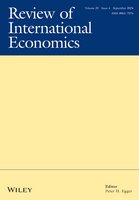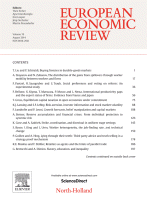Prof. Dr. Andreas Steiner | Professor für Internationale Wirtschaftsbeziehungen
Allgemein:
Raumnummer:
N-1-12
E-Mail:
Andreas.Steiner(at)hs-rm.de
Telefon:
+4961194953149
Postanschrift:
Postfach 3251
65022 Wiesbaden
Besuchsadresse:
Bleichstraße 44
65183 Wiesbaden
Sprechzeiten:
nach Vereinbarung
- Assistenzprofessor für Internationale Monetäre Makroökonomik am Department of Global Economics and Management, Universität Groningen, Niederlande (2016-2024)
- Wissenschaftlicher Mitarbeiter am ifo Institut, Zentrum für Konjunkturforschung und Befragungen, München (2015-2016)
- Akademischer Rat am Fachgebiet Internationale Wirtschaftspolitik, Universität Osnabrück; Mitglied des Instituts für Empirische Wirtschaftsforschung, Universität Osnabrück (2009-2015)
- Dr. rer. pol., Universität Mannheim, Center for Doctoral Studies in Economics (2009)
- Internationale monetäre Makroökonomik
Veröffentlichungen in begutachteten Zeitschriften


- “Capital Flow Reversals and Currency Crises: Do Capital Flow Types Matter?” (with Mengting Zhang, Jakob de Haan and Haizhen Yang), Review of International Economics 32,4 (2024): 1787–1823.
DOI: https://doi.org/10.1111/roie.12753
- “Monetary Policy When the Zero Lower Bound Is Within Reach: A Smooth Transition Regression Approach”, Macroeconomic Dynamics 25, 1 (2021): 201-212.
DOI: https://doi.org/10.1017/S1365100518000718.
- “Exit Strategies, Capital Flight and Speculative Attacks: Europe's Version of the Trilemma” (with Sven Steinkamp and Frank Westermann), European Journal of Political Economy 59 (2019): 83-96.
DOI: https://doi.org/10.1016/j.ejpoleco.2019.02.003
- “International Reserves and the Maturity of External Debt” (with Xingwang Qian), Journal of International Money and Finance 73, PB (2017): 399-418.
DOI: https://doi.org/10.1016/j.jimonfin.2017.02.015
- “Central Banks and Macroeconomic Policy Choices: Relaxing the Trilemma”, Journal of Banking and Finance 77 (2017): 283-299.
DOI: https://doi.org/10.1016/j.jbankfin.2015.07.005
- “Does the Accumulation of International Reserves Spur Inflation? A Reappraisal”, North American Journal of Economics and Finance 41 (2017): 112-132.
DOI: https://doi.org/10.1016/j.najef.2017.03.007
- “Reserve Accumulation and Financial Crises: From Individual Protection to Systemic Risk”, European Economic Review 70 (2014): 126-144.
DOI: https://doi.org/10.1016/j.euroecorev.2014.04.005
- “International Reserves and the Composition of Equity Capital Inflows” (joint with Xingwang Qian), Review of International Economics 22, 2 (2014): 379-409.
DOI: https://doi.org/10.1111/roie.12113
- “Current Account Balance and Dollar Standard: Exploring the Linkages”, Journal of International Money and Finance 41 (2014): 65-94.
DOI: https://doi.org/10.1016/j.jimonfin.2013.10.005
- “The Accumulation of Foreign Exchange by Central Banks: Fear of Capital Mobility?”, Journal of Macroeconomics 38, Part B (2013): 409-427.
DOI: https://doi.org/10.1016/j.jmacro.2013.08.002
- “How Central Banks Prepare for Financial Crises - An Empirical Analysis of the Effects of Crises and Globalization on International Reserve Holdings”, Journal of International Money and Finance 33 (2013): 208-234.
DOI:https://doi.org/10.1016/j.jimonfin.2012.11.012
- “Do Dynamics and Heterogeneity in Panel Data Models Matter? An Application to Central Banks’ Demand for International Reserves”, Empirical Economics 40, 1 (2011): 165-176.
DOI: https://doi.org/10.1007/s00181-010-0423-2
- “Contagious Policies: An Analysis of Spatial Interactions Among Countries’ Capital Account Policies“, Pacific Economic Review 15, 3 (2010): 422-445.
DOI: https://doi.org/10.1111/j.1468-0106.2010.00511.x
- siehe auch meine Seite auf IDEAS/RePEc: Economics and Finance Research
Bachelor International Management
- Internatonale Wirtschaftsbeziehungen (3. Semester)
- Problems in Economic Development (4. Semester)
- European Integration & European Sustainability Economics (5. Semester)
- Thesenbetreuung
Master International Management
- Managerial Economics
- Thesenbetreuung
Index of private financial openness
Beschreibung
Diese Datenbank enthält den Index der privaten Finanzoffenheit von Ländern (index of private financial openness, PRIFO). Der Index ist definiert als die Summe der privaten Auslandsvermögenswerte und der privaten Auslandsverbindlichkeiten eines Landes dividiert durch das BIP. Diese Kennzahl ist marktorientiert, da sie sich auf die Bereitschaft und Fähigkeit privater Akteure konzentriert, im Ausland zu investieren und Auslandsschulden aufzunehmen. Einzelheiten finden Sie in Steiner (2021).
Referenz:
Steiner, Andreas (2021), “Measuring De Facto Financial Openness: A New Market-Based Indicator and Its Application,“ University of Groningen, mimeo.
Datum der Bereitstellung 2022
Zeitraum des Datensatzes 1970 – 2020
Datum der Datenerstellung 2022
Geografische Abdeckung weltweit